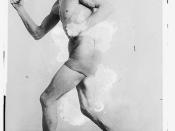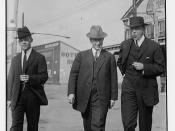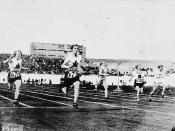Ambition The Third College Edition of the Webster's New World Dictionary defines the word ambition as "a strong desire to gain a particular objective."� James Champy a Greek philosopher once said, "Big results require big ambitions."� Ambition is evident whenever an individual strives to accomplish whatever he desires no matter what stands in his way.
The Wrigley Company was started by William Wrigley Junior who had big ambitions to start his own business. Wrigley became a very talented salesperson at a young age working for his father, who was a soap manufacturer. While Wrigley was selling soap for his father, he got the idea to offer premiums, which are free objects that help the sale of another object. One of his premiums was baking-powder. When baking-powder became more popular than the soap, he began his own baking-powder business. Then he offered two packages of chewing-gum with every box of baking powder.
Once again people began buying the baking-powder just for the gum, so he started a chewing-gum business. He decided gum had the potential he was looking for. There were around twelve other gum companies in the United States at the time. Wrigley's company got off to a slow start because the other companies had better known products. The company almost went under several times, but his hard work and ambition helped him overcome the difficulties. To help his business, William continued to give out premiums ranging from lamps to razors to scales. He also used advertising to help his business grow. People began to ask for and buy more of his gum. Wrigley is now an international business and is arguably the best-tasting gum in America.
Along with William Wrigley Junior's act of ambition, Frederick W. Smith also has big ambitions to start a business. Smith wrote a term paper at Yale University as an undergraduate about the passenger-route system. In his paper he said America needed a system that could send shipments such as medicines, computer parts, and electronics around the United States in a few days. His professor disagreed with his idea and said it was inadequate. Smith wasn't going to let his professor stop him from accomplishing his goal. He brought his idea to Little Rock, Arkansas. As he began to experiment, he found out it was hard to deliver packages in a day or two. After a few more months of research, Smith worked out all the problems. When he finally got his company up and running smoothly, he named it Federal Express. Smith thought it had a patriotic meaning, and it suggested an interest in nationwide economic activity. He made his main headquarters at Memphis, Tennessee. The weather conditions were excellent, so the flights were rarely delayed. He also picked Memphis because it was the center of the original target market cities for small packages. Federal Express is still running to this day, although Smith was told it would never work.
To sum up, Wrigley and Smith both stood strong in achieving their objective and never gave up. Although Wrigley's business almost went under several of times, and Smith's professor told him his business would never work, both men's ambition helped them to accomplish their desires. James Champy would agree that both men needed big ambitions to achieve their big results.




![Gunboat Smith & Pelky [i.e., Pelkey] (LOC)](https://s.writework.com/uploads/5/58384/gunboat-smith-pelky-e-pelkey-loc-thumb.jpg)
